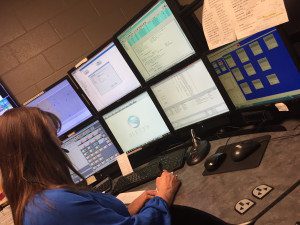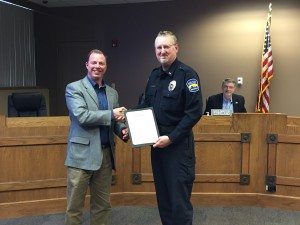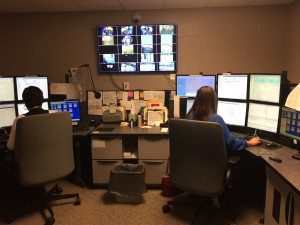 Tucked away in a windowless room behind a heavy locked door at the Washington County Detention Center is the Enhanced-911 Dispatch Center. Here, 16 dispatchers, spread out over three different shifts, receive calls for help from Washington County residents, determine the appropriate action, dispatch emergency responders and monitor the situation until it is resolved.
Tucked away in a windowless room behind a heavy locked door at the Washington County Detention Center is the Enhanced-911 Dispatch Center. Here, 16 dispatchers, spread out over three different shifts, receive calls for help from Washington County residents, determine the appropriate action, dispatch emergency responders and monitor the situation until it is resolved.
First line of defense
E-911 dispatchers are the first line of defense for citizens needing assistance —in everything from routine to life threatening situations — yet they often go unrecognized for their service. But on April 4, the Bartlesville City Council proclaimed April 11-15 Public Safety Communications E-911 Professionals Week in an effort to give some credit where it’s due. The proclamation is in conjunction with National Public Safety Telecommunicators Week, a nationwide recognition.
“Public safety telecommunicators are the first and most critical contact citizens have with emergency services during a crisis and are the single vital link for law enforcement, firefighters and paramedics in monitoring their activities by radio, providing them information and ensuring their safety,” Vice Mayor Dale Copeland said during the April 4 City Council meeting.


“Our 911 dispatchers are some of the best in the state — and beyond,” said BPD Lt. Kevin Ickleberry, who, in addition to other duties, oversees the police department’s Dispatch Services. “They have a tremendous amount of responsibility and work in a highly technical and stressful environment, yet they never fail to provide the highest quality of service possible. We are thankful the City Council has recognized E-911 dispatchers for the service they provide. It is well deserved.”
The process
E-911 dispatchers are the ultimate multi-taskers, monitoring as many as seven computer screens, keeping tabs on the whereabouts and safety of emergency responders for multiple agencies and answering calls from the public — all at the same time.
Pointing to one of the many computer screens adorning her work-station, E-911 Dispatcher Tammie Long describes the process.
“If it’s a 911 call it will come up on this screen,” she says. “Then we’ll move to the Computer Aided Dispatcher (CAD) screen and create an ‘Incident’ log, where information about the call will be entered in real time. We’ll put the person’s information there, their name and phone number, and any notes that might be pertinent to the call or information the officer might need. We save the call, and it will transfer to a screen that will show all of the calls that are holding. On that screen, we can see which officers are working in which districts, so we’ll find which officer is available in that district and dispatch them to the call.
“We keep track of everything that happens during that call in the Incident (log). If an officer is on a traffic stop, we’ll log that and we’ll use what’s called the OLETS (Oklahoma Law Enforcement Telecommunications System) terminal, which allows us to run people’s driver’s licenses and car tags and to see if anybody’s wanted or if they’re missing, such as a runaway juvenile.”
The Incident/status log shows the dispatcher which emergency responder is assigned to the call, where they are, when they were dispatched and when they arrived, as well as specific information about the incident.
“When the call is finished, we clear it,” Long says.
Behind the scenes
This constant monitoring, answering phone calls and providing responding personnel with the information they need proves for a hectic pace inside the center. But the dispatchers — three are on duty most of the time — appear unfazed.
“It can get busy, but that’s true for all facets of emergency response,” Long says. “Sometimes you may have three emergencies going on at the same time, so (responders) have to do a bit of a triage to decide which emergency is priority at any given time — who’s more in danger. Sometimes that’s difficult for citizens to understand. They don’t have any way of knowing everything that is going on at the time they are calling. So, for instance, if somebody just broke into their house, they would consider that an emergency — and it is. But if they’re not IN their house and somebody is getting assaulted elsewhere, we’re going to respond to that emergency first. We’ll tell the citizen to not go inside their house, but they may have to wait for an officer outside.”
Because dispatchers are generally out of the public eye, their protocols and procedures — as well as their challenges — are not widely known. Some misconceptions about the center are assumptions that all citizens can be electronically tracked and dispatchers have access to national computer systems and files. Not so, Long says.
But the most important misconception that E-911 dispatchers wish the public better understood is why dispatchers ask so many questions when citizens call for help, and that help is sent long before citizens typically think it is.
“When a person is involved in an emergency situation, they often lose the true sense of time. Every minute feels like five minutes,” Long says. “So people will sometimes feel like it’s taking us a long time to respond to them, when in reality it hasn’t been very long at all. Also, they can become excited and sometimes they don’t realize they are screaming or aren’t coherent, and it can be difficult for us to understand what they are saying.
“So we may have to ask them to repeat things, and sometimes people get upset. They think that as long as they’re talking to us, that means we haven’t sent an officer or fire or ambulance, whereas we can do those things all at the same time. They don’t hear that, so they don’t know, but typically, we send the officer (or appropriate responder) as soon as they’ve told us what kind of call it is and an address that we can send them to. That’s usually when we get somebody started to the call.”

All in a day’s work
Bartlesville E-911 dispatchers handled 133,593 phone calls in 2015, logged 41,173 incidents and generated 5,938 reports. Calls dispatched to area agencies totaled 36,221 assignments — nearly 20,000 of which were assigned to Bartlesville police.
“Our dispatchers in many respects are the backbone of law enforcement. They are the first people who get called when something goes awry,” said Police Chief Tom Holland. “They deal with people who are scared, hurt, mad — the whole gamut. They save lives both directly and indirectly by getting help to the appropriate place and by teaching people — over the telephone — how to perform live-saving techniques like clearing babies’ throats or CPR. They are amazing people.”
For more information about the Bartlesville E-911 Dispatch Center, visit https://www.cityofbartlesville.org/public-safety/police-department/emergency-911/
